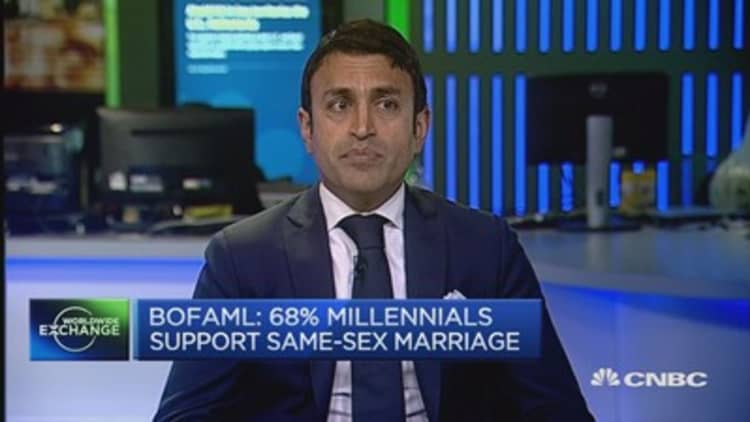The future economic impact of the millennials generation has been analysed in a report from Bank of America Merrill Lynch.
The report, called "Thematic Investing: Generation Next," examines the traits and characteristics of millennials—those born after 1980—and identifies eight investment themes and over 250 global companies that are exposed to and likely to benefit from this new demographic.
Read MoreBaby bust! Millennials' birth rate drop may signal historicshift

These themes include technology, consumers, education and the sharing economy.
The report suggests millennials tend to be more socially liberal and less religious than previous generations. They have also had more education, suggesting their future earning potential could be higher.
Read MoreMillennial managers struggle for work-life balance
For instance, the income of millennials in the U.S. will reach $8.3 trillion by 2025, compared to the $1.3 trillion that they currently account for in annual consumer spending. They will also receive around $40 trillion in transferred assets from the baby boomer generation. Globally, millennials will make up 75 percent of the workforce by 2025.
Sarbjit Nahal, managing director and head of thematic investing at Bank of America Merrill Lynch and one of the report's writer, suggested that millennials will have a big influence on technology stocks as they tend to be early adopters.
Nahal told CNBC Wednesday that there are "huge opportunities" for the tech space being created, with millennials being two and a half times more likely to adopt technology than previous generations.
"Ninety percent of them own mobiles devices. 76-83 percent own smartphones and somewhat worryingly, 50 percent of them would likely give up their sense of smell, rather than give up their technology."
According to the report, millennials are 2.5 times more likely to be an early adopter of tech than older generations. Globally, around 76 percent have a smartphone, which are used as a gateway device to access internet services, play games and listen to music.
"For North American millennials, (we will see) spending about $62 billion this year in terms of media," according to Nahal who added that the biggest area of spending on paid TV, cable TV as well as streaming.
Read MoreJob hunting tips for millennials
Nahal also recommended stocks in the consumer spending sector. He said: "We think there's huge consumer opportunities. Some of the stocks in spaces like fast fashion as well as off price retail are going to be big beneficiaries off the back of this trend.
"We also like the affordable luxury space. This is becoming an increasingly important space. We are going to be looking at a $400 billion market by the end of the decade."
However, when asked about millennials "fickle" purchasing behavior and not as "brand loyal" as previous generations, Mr Nahal suggested companies need to modify their business models to capitalize on this.
"Companies need to tweak their business models to adapt to the key desires of millennials" said Nahal, suggesting price, convenience and quality as three key strategies to focus on.
The report does highlight some problems, such as lower employment rates and depressed wages for millennials, which may hold back consumer spending. The employment rate of 20-24 year olds in the U.S. is 63.2 percent, which is below pre-recession levels of around 70 percent. Median income for those aged under 35 in the US fell from $42,000 to $35,000 from 2007 to 2013.
"Millennials face a different situation than most generations when entering the workplace," explained Andrew Challenger, vice president at Challenger, Gray & Christmas. "There's a huge build-up because there wasn't a job in 2008 so a lot of people were under-working or went back to school and now ... they are fighting for jobs with people graduating today."
-With contribution from CNBC's Landon Dowdy
Follow us on Twitter: @CNBCWorld

